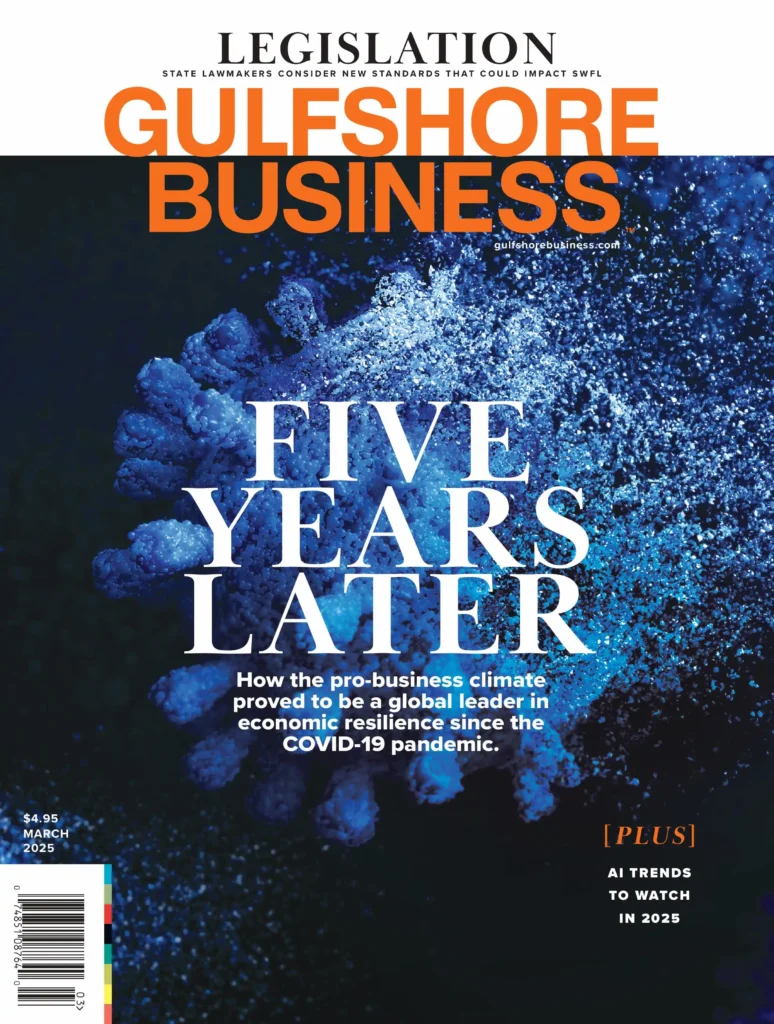
Stuart Varney [Photo Credit: FOX Business Network]
When Gulfshore Business spoke with Varney, his show was celebrating its 10-year anniversary. “Varney & Co.” was recently ranked as the top business day television program (between the hours of 9:30 a.m. and 5 p.m.), pushing past CNBC’s equivalent in the total number of viewers for the third consecutive year, according to Nielsen Media Research.
When he isn’t covering breaking business news and its economic impact on the nation, Varney runs a tree farm in upstate New York. One of the few times that the news anchor truly takes a break is when he shuttles down to Florida to spend time in his Naples vacation home.
“I spend as much time in Naples as I possibly can,” he says. “I really like going to the beach at sunset. The sun sets perfectly right on the ocean. It’s very pretty, poignant; it’s something I do every time I’m down there.”
Do you think the recent trade deal with China is worth it? How do you think it might help the United States?
I think it’s a very good trade deal that really breaks new ground. There are all kinds of things inside this deal which we’ve not done before. It’s more than just China buying more of our stuff; it’s China agreeing to change the way they do business and having a mechanism for resolving disputes. If we make an agreement with China as we have, what happens if one side breaks the agreement? An administrative system within China and an appeal that can be made. If China breaks the rules – and they have broken the rules a lot in the past – they were never held accountable, but now they can be held accountable.
I think it will add significantly to our economy. We will sell more to them. I was talking to Larry Kudlow, the White House economic adviser, just the other day – he thinks we’ll add about three-quarters of 1 percent to our gross domestic product. Doesn’t sound like much, [but] that is absolutely enormous.
How has the outbreak of the coronavirus affected this trade deal?
The virus will have a serious long-term impact on China’s economy. In the future, American companies will not be willing to allow China to control their supply chain in the way it does now. This is especially true of pharmaceutical products. At the moment, China controls 80% of the ingredients that go into ordinary, common drugs like penicillin. That will not be allowed to continue.
What are your projections for the economy this year and areas where you see growth?
I think the economy continues to expand at a rapid rate that would be close to 3 percent in 2020. That’s a strong growth rate. One other thing I want to mention is the Florida economy: It’s going to do better than almost any other state because, under the new tax laws, high tax states like Connecticut, New Jersey, New York – they are running people out of town because they have very high tax rates. But Florida does not have a state income tax, and that’s very attractive to high-income people – 76,000 people left New York last year, and most of them went to Florida. That’s going to be a huge shot in the arm to the Florida economy.
Will the coronavirus have a lasting impact on our economy?
This is a temporary blip on the American economy. It may last into the summer. If it does, it will seriously slow down the economy in the middle of the year. However, I expect a sharp bounce back as soon as we can see light at the end of the virus tunnel.
What do you think about the bill that was passed last summer to increase the minimum wage? *(This bill will increase the minimum wage to $15 an hour over a six-year period from the effective date of the bill. Florida’s current minimum wage is $8.46.)
I think it will improve the consumer’s strength in that if you pay people on a mass basis a little bit more, that’s money that flows directly into the economy. It increases consumer demand. I think it poses some problems for the restaurant business and the hospitality business, which require a lot of people to work – and if you suddenly raise the cost of employing them, you will employ fewer of them. In that, then, I think it’s a problem and a negative.
What keeps you up at night when it comes to the economy and the market?
The sudden, unforeseen “black swan” event. That’s an event that comes out of nowhere, that you cannot forecast. It might be an earthquake, it might be a natural disaster, it might be a sudden war. A sudden event that takes everybody by surprise and pulls [the] market down dramatically. There’s always that possibility.
The other thing that keeps me up is: When you’ve got a stock market that’s gone up for 11 years, and gone up enormously in 2019, it is natural to expect a pullback, sometimes called a correction. It could be 10 or 20 percent down. That often happens. In fact, it usually happens after a very strong bull market. But, of course, you cannot forecast it. You’ve just got to be aware of the possibility.
Would you consider the coronavirus to be a black swan event?
The virus is not a black swan event. It has had a short-term impact, but I believe we will come out on the other side by the summer. When we get the first sign that the impact is winding down, the market will rebound and so will the economy.
What books or reading would you recommend to our subscribers?
The Wall Street Journal. Every day. I like The Wall Street Journal because it’s very well written. They believe in free markets and capitalism, and that’s what I’m all about. I’m (also) reading Alexander Dumas’ The Count of Monte Cristo! It is the great novel about revenge but ends with enlightenment.





